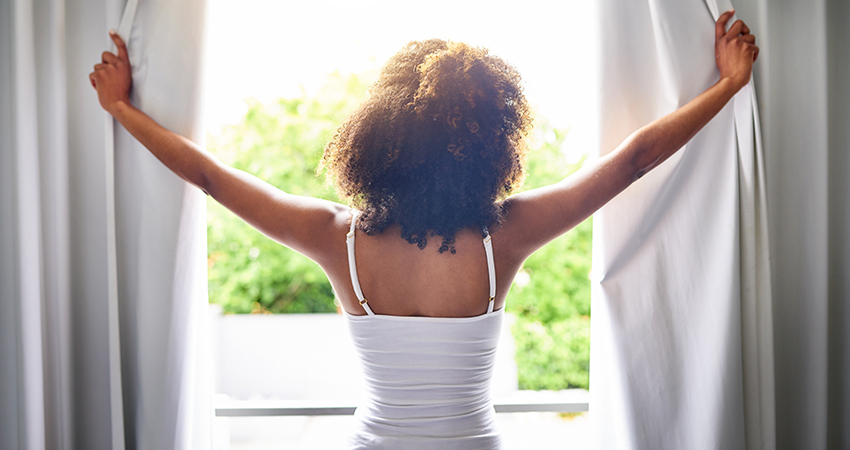Having difficulty sleeping during quarantine? You’re not alone. Sleep neurologists are reporting an increase in sleep issues due to the COVID-19 pandemic. They’re calling it “COVID-Somnia,” according to Neurology Today.
Acute insomnia and chronic insomnia are the two types of insomnia, according to Sleep.org. Acute insomnia lasts from one night to a few weeks and normally goes away on its own without any need for medical intervention. Chronic insomnia occurs if you have disrupted sleep at least three nights per week for at least three months. Sleep disruption, as defined by Johns Hopkins Medicine, is insufficient sleep to support adequate alertness, performance and health, either because of reduced total sleep time or fragmentation of sleep. Sleep is a key promoter of emotional wellness and mental health, according to SleepFoundation.org. It’s also crucial to physical wellbeing and a normal functioning of the immune system. For those of you who have been experiencing restless nights of late, the good news is that there are steps that you can take to improve your sleep during quarantine.
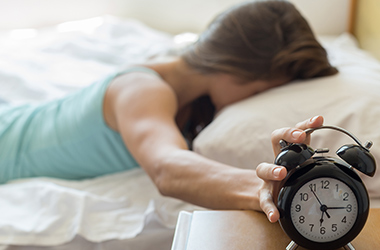
Create a sleep-wake schedule (and stick to it!)
“The most important thing that you can do right now to improve your sleep is to keep a regular sleep-wake schedule.” SleepFoundation.org recommends that you have a fixed wake-up time every day (and don’t hit the snooze button), set aside wind-down time at the end of each day to relax and get ready for bed (light reading, stretching and/or brushing your teeth), and have a consistent time that you turn off the lights and try to fall asleep.
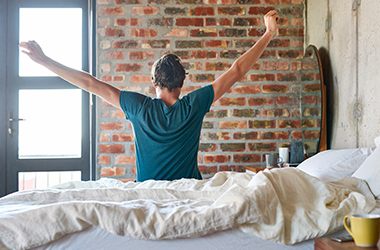
Manage light exposure
Natural light has a positive effect on your circadian rhythm, according to SleepFoundation.org, with exposure to light playing a key role in helping your body regulate sleep in the proper way. They recommend opening windows and blinds during the day to let light into your home as much as possible. While you should get at least 30 minutes of natural light prior to midday, you should minimize exposure to bright light and blue and green wavelength light from your phone, tablet and/or computer at night, according to Johns Hopkins Medicine, as it can negatively impact your body’s natural melatonin production and potentially make it difficult to fall asleep. It’s recommended that you use the blue light filter/night shift setting on all your electronic screens in the evening, and “unplug” from smartphones, tablets and computers about 1.5 to 2 hours before going to bed.
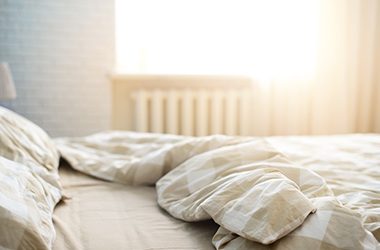
Your bed is for sleep (and sex)
Just because you’re able to work from home, it doesn’t mean that you should do your work in bed. Sleep experts emphasize the importance of creating an association in your mind between your bed and sleep, which is why SleepEducation.org suggests only using your bed for sleep and sex. That means not watching movies or TV shows on your laptop in bed, especially since we know that we need to limit bright light and blue and green wavelength light exposure at night. And since your bed is intended for sleep, SleepFoundation.org recommends getting out of bed if you haven’t fallen asleep after 20 minutes, doing something relaxing in low light, then heading back to bed to try and fall asleep again.
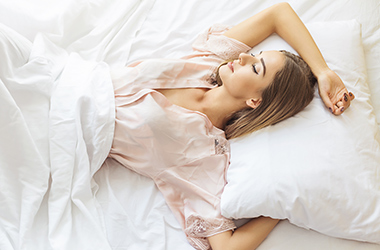
Focus on self-care
While there are many things that are out of your control due to COVID-19, it’s important to focus on the things that you can control, like how you treat yourself. Creating a self-care ritual that includes evidence-based techniques to supportrelaxation – such as mindfulness meditation, yoga, tai chi, deep breathing exercises and progressive muscle relaxation – can lead to stress reduction, according to Johns Hopkins Medicine, which may help you sleep better.
Maintaining a healthy diet can also support good sleep, so it’s important that you watch what you eat and drink. Consuming alcohol and caffeine, especially later in the day, can disrupt the quantity and quality of your sleep. The American Academy of Sleep Medicine and the Sleep Research Society recommend that adults get around seven or more hours of sleep per night to avoid the health risks of chronic inadequate sleep.
